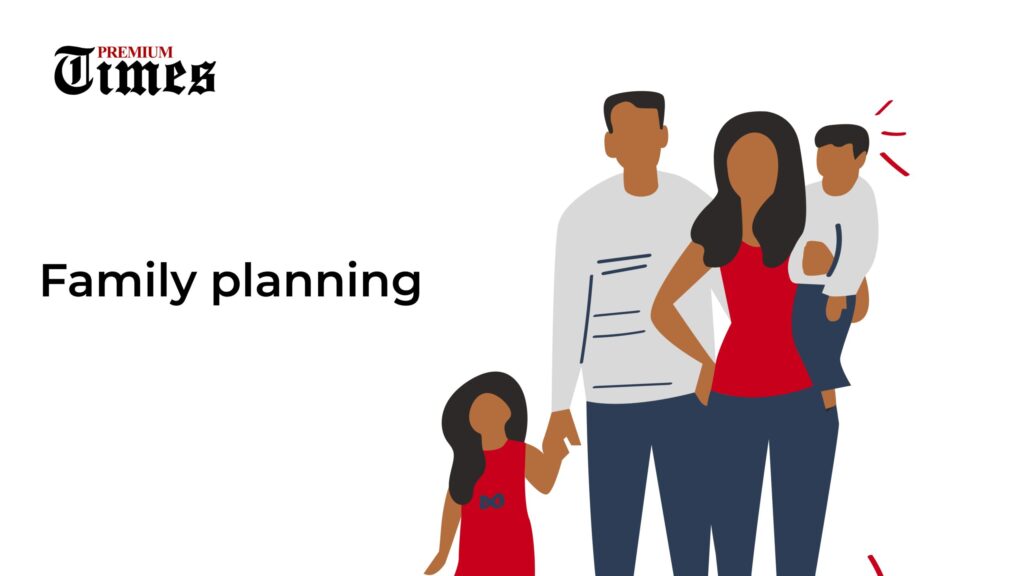The Nigerian government has reduced its family planning budget for 2025, raising concerns about how the country will sustain access to reproductive health services for millions of citizens amidst a global decline in donor funding.
In the 2025 budget, N66.39 million was allocated for family planning, a 97 per cent decrease from the N2.2 billion allocated in 2024.
This budget cut comes as the United States Agency for International Development (USAID) froze funding support for key health initiatives in developing countries, including family planning programmes in Nigeria. The funding pause followed a directive from President Donald Trump shortly after his inauguration in January 2025.

The Nigerian government has not given any official reason for cutting funding for family planning. Repeated efforts to get a response from the health ministry were unsuccessful. This reporter was referred to the ministry’s Director of Family Health, Binyerem Ukaire, by other ministry officials. However, in response to our enquiries, Ms Ukaire simply said, “To get reaction from the government, you need to go through the right channel.”
For a country with one of the highest maternal death rates in the world, with many of the deaths preventable with timely access to contraception and quality care, this drop in funding could reverse the progress made over the years.
The United Nations recently warned that global reductions in health aid could reverse decades of progress in tackling maternal mortality.
In a report titled Trends in Maternal Mortality, released ahead of the 2025 World Health Day, the UN attributed the 40 per cent global decline in maternal deaths between 2000 and 2023 to improved access to critical health services.
Nigeria, according to the report, had the highest estimated number of maternal deaths in 2020, accounting for more than one-quarter (28.5 per cent) of the global total, with approximately 82,000 maternal deaths recorded.
Trend in budget allocation
Over the years, PREMIUM TIMES has reported Nigeria’s inconsistent commitment to family planning, particularly in the face of declining donor support.
In 2020, under former President Muhammadu Buhari’s administration, the family planning programme received only 0.2 per cent of the health budget and in 2021, the allocation dwindled further to 0.01 per cent of the health budget. In subsequent years, 2022 and 2023, the budget line for family planning was non-existent.
Following reports by PREMIUM TIMES highlighting the government’s failure to include family planning in the 2022 budget, and demands by activists and civil society organisations, the government committed to allocating at least one per cent of its health budget to family planning.
Although there was an increase in family planning allocation in 2024 (N2.225 billion), it still fell short of the national commitment to dedicate at least one per cent of the annual health budget to family planning.
Health experts have repeatedly stressed the importance of sustained domestic investment in reproductive health as a way to manage Nigeria’s growing population and reduce preventable maternal deaths.
Nigeria’s 2025 budget totals N54.9 trillion, with N2.38 trillion dedicated to the health sector, which amounts to 4.33 per cent of the budget. Within this health allocation, only N66.39 million (0.0028 per cent) was earmarked for family planning, which falls far below one per cent of the health budget.
This underfunding of family planning raises concerns about Nigeria’s ability to achieve its Family Planning 2030 (FP2030) targets, which aim for a 27 per cent modern contraceptive prevalence rate (mCPR) by 2030.
Stanley Ukpai, the director of Programmes at the development Research and Projects Centre (dRPC), expressed concerns with the reduction, saying Nigeria is still struggling to close a longstanding gap in family planning funding.
According to him, the country has depended heavily on external sources to support reproductive health services for years.
Mr Ukpai noted that following the N2.2 billion allocated to family planning in the 2024 budget, advocates and stakeholders were optimistic that the 2025 budget would show continued progress.
“In 2024, we saw a significant step forward with the N2.2 billion allocation, which was an attempt to address the financing gap. I understand that the funds were eventually released in December,” he said.
“But we were shocked to see that only N66 million was allocated for family planning in 2025.”
Dependence on donors, risks
Nigeria has depended heavily on foreign donors to support its family planning programmes for years.
Organisations like the United Nations Population Fund (UNFPA) and the USAID played key roles in supplying contraceptives and funding training and outreach activities.
UNFPA supports family planning in 19 states and the Federal Capital Territory, while USAID partnered with community groups across all 36 states.
However, this dependence comes with its risks. In 2021, the United Kingdom withdrew its annual funding of about £3 million from Nigeria’s family planning basket fund.
Then, in January 2025, USAID paused funding. Based on the US Foreign Assistance website data, the United States disbursed approximately $1.02 billion in foreign assistance to Nigeria in 2023.
While the site breaks down funding across various sectors, it does not specify the exact amount allocated exclusively for family planning.
However, a significant portion of US assistance to Nigeria historically supported health initiatives, including family planning.
For instance, in 2020, USAID allocated $35 million for family planning efforts in Nigeria as part of a broader $234.5 million development assistance package.
Implications of funding cuts
Ijeoma Nwankwo, programme manager at the Pharmaceutical Society of Nigeria Foundation (PSNF), expressed deep concern over the recent cut in Nigeria’s family planning budget, describing it as a major threat to reproductive health service delivery, especially in rural and underserved communities.
Ms Nwankwo, a pharmacist, said this drastic reduction will significantly hinder access to essential family planning commodities and services for millions of women, particularly those in hard-to-reach areas who already face barriers due to distance, cost, and cultural stigma.
“Without adequate funding, we risk reversing the progress made in reducing maternal mortality and improving women’s health outcomes,” she said.
Mr Ukpai, the dRPC director of programmes, noted that with the withdrawal of key international donors like the US, UK, and EU—many of whom are redirecting funds to other priorities like national defence—Nigeria now faces a widening funding gap.
He warned that these global aid reductions could have significant implications for the country’s reproductive health services, especially if domestic investment continues to decline.
The impact of family planning underfunding is already visible. According to reports, the number of women receiving family planning services has sharply declined.
Saleh Abba, a family physician based in Borno State, recently disclosed in an interview that family planning uptake in Borno State dropped from 13,000 women in January to just 3,000 in February this year.
Ms Abba stated that the shortage of contraceptive supplies and the pause in donor funding are major reasons for this decline.
Need for increased domestic funding

In 2020, the Nigerian government introduced a Family Planning Blueprint (2020–2024), a strategic document aimed at increasing access to modern contraceptives and reducing maternal deaths.
The blueprint provided a clear roadmap with targets and accountability measures. However, as it ended in 2024, many of its goals remained unmet due to inconsistent funding and heavy reliance on donor support.
Health professionals and advocacy groups have warned that relying too much on foreign support is risky.
A 2023 study published by BMC’s Women’s Health, a journal focused on the health and wellbeing of adolescent girls and women, highlighted the country’s heavy reliance on external funding.
The study titled: “A narrative review of evidence to support increased domestic resource mobilisation for family planning in Nigeria,” emphasised the urgency of increasing domestic funding for family planning in Nigeria to ensure sustainability and reduce dependency on external donors.
According to the study, the heavy reliance on external donors makes funding for family planning services unpredictable and imbalanced.
Evidence shows that investing in family planning can also save money. Preventing unwanted pregnancies reduces pressure on hospitals and cuts the cost of maternal health care.
According to global estimates by UNFPA and the Guttmacher Institute, every dollar spent on family planning can save up to four dollars in maternal and newborn health costs. When translated into local currency, this suggests that for every N1,000 spent, Nigeria could save about N4,000 in healthcare costs.
State financing, private sector involvement
Stanley Ilechukwu, executive director of the South Saharan Social Development Organisation (SSDO), noted that although the cessation of funding has thrown Nigeria’s health sector into disarray, there are still ways to mitigate the damage.
He pointed out that the recent judicial stamp on the autonomy of Local Government Areas (LGAs) presents a unique opportunity to address the funding shortfall.
READ ALSO: Global health at risk as 70% of countries struggle with funding cuts — WHO
“With LGAs now ‘autonomous’, we should begin to hold them to the same standards as the federal and state governments and make them commit to the same pledges, particularly with regards to healthcare financing,” he said.
He proposed that a portion of LGA funding should be earmarked for procuring family planning commodities. He believes that if all LGAs commit, along with matching funds from state governments over a four-year period, this could help create a sustainable market for family planning commodities in the country.
Mr Ilechukwu added that balancing the demand and supply side of family planning services is key to ensuring both immediate and future needs are met in a sustainable way.
“It is critical to ensure that we are not just dependent on donor funding but are also creating domestic solutions to address these challenges,” he said.
Ms Nwankwo, the pharmacist, emphasised that while donor funding has historically supported Nigeria’s family planning initiatives, relying solely on external partners is not sustainable.
“It’s time for the government, at all levels, to take ownership of reproductive health programmes. States must begin to allocate and release dedicated budgets for family planning as part of their commitment to primary health care and women’s health,” she said.
Ms Nwankwo also highlighted the role of the private sector in bridging funding gaps.
According to her, the private sector can play a critical role — from strengthening supply chain systems to investing in public awareness campaigns and driving innovation around contraceptive access.
She called on the government to take proactive steps to ensure the continuity and sustainability of family planning services nationwide.
Support PREMIUM TIMES’ journalism of integrity and credibility
At Premium Times, we firmly believe in the importance of high-quality journalism. Recognizing that not everyone can afford costly news subscriptions, we are dedicated to delivering meticulously researched, fact-checked news that remains freely accessible to all.
Whether you turn to Premium Times for daily updates, in-depth investigations into pressing national issues, or entertaining trending stories, we value your readership.
It’s essential to acknowledge that news production incurs expenses, and we take pride in never placing our stories behind a prohibitive paywall.
Would you consider supporting us with a modest contribution on a monthly basis to help maintain our commitment to free, accessible news?
TEXT AD: Call Willie – +2348098788999




